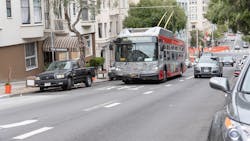SFMTA’s new transit lanes for Muni’s 1 California customers
The San Francisco Municipal Transportation Authority (SFMTA) has finished almost three miles of new and expanded transit lanes serving the 1 California.
These transit improvements are part of the 1 California Temporary Emergency Transit Lanes project that was approved last April to help maintain travel time and reliability for the more than 10,000 daily customers who depend on this vital east-west connector.
In April 2020, when traffic levels were reduced during the shelter-in-place, SFMTA saved so much time on the 1 California that it was able to provide the same service frequency while reducing the number of buses on the line—requiring two to three fewer buses per day. Nearly two-thirds of households along the 1 California route in Chinatown and Nob Hill do not own cars, and prioritizing transit is critical to their daily transportation needs.
The new temporary emergency transit lanes on Clay and Sacramento streets downtown and on California Street west of Steiner help lock these service improvements in place by protecting the bus from delays as the city reaches pre-pandemic traffic congestion levels. Ridership on the 1 California has begun to increase as public health orders ease and the region moves into greater levels of economic reopening. This makes it more important to continue assisting those customers whose primary mode of transportation is Muni.
On Clay and Sacramento Streets, SFMTA made part-time transit lane hours more consistent and focused on expanding lanes at locations where the data has demonstrated the greatest potential benefit. SFMTA also implemented transit lanes on California Street from Steiner to Presidio without removing parking.
And remember, please observe parking signs on Clay and Sacramento Streets where transit lanes are located, as tow-away restrictions are now being enforced.
Earlier this winter and spring, SFMTA conducted extensive outreach and revised the final project design based on what was heard. Now that the transit improvements are in place, SFMTA is reaching back out to the community for feedback on their direct experience with the new transit lanes. Public input, along with SFMTA’s technical analysis of traffic patterns, Muni performance and other factors, will help determine whether transit lanes for the 1 California should be kept in place once the final public health restrictions are lifted.
